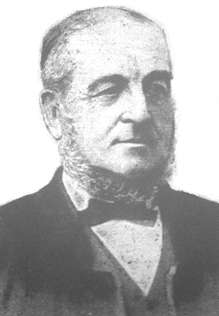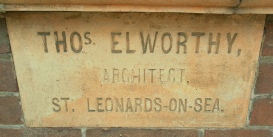Friends of Hastings Cemetery


List (not inclusive) of Works
- 1865 -
Central Memorial Chapel - 1866 – A new type of workmen's home to be erected north of Warrior Square, designed by Messrs. Tree & Elworthy / -
University School, Holmesdale Gardens.re Wesleyan Chapel / St Helen’s Methodist Church / Christ Apostolic Church - Park House School -
Mr. Jas. Elliott, 8,A., has decided upon the erection a villa and school premises Upper Maze hill. The tender of Messrs. Hughes, at £2,124 3 been accepted. Mr. T. Elworthy is the architect. - 1867 -
A new shed on the corner of Hatheryly & Southwater Roads, erected for Cinque Ports Artillery Volunteers, Thomas Elworthy the architect. - 1876 -
New Croft Chapel / Robertsbridge Congregational Church - 1878 -
Wellington Square Baptist - alterations - 1877-
79 Mount Pleasant Congregational Church. - 1878/79 -
Mount Pleasant Congregational Church - 1881 -
Battle Congregational Church - 1882 -
ST LEONARD'S BAPTIST CHURCH CHAPEL PARK ROAD / House, Filsham Road, St Leonards for H Sutherland, Southwark, London by Thomas Elworthy - 1886 -
Clive Vale United Reformed Church - 1893 -
Three blocks of workmen's flats, [16- 38 St Saviour's Road], St Leonards for E R Stone, Edenreagh, Filsham Road by Thomas Elworthy, 101 London Road, St Leonards, architect and Eldridge and Cruttenden [builders] - 1894 -
BULVERHYTHE CONGREGATIONAL CHURCH - 1897 -
New water closet and drainage, Presbyterian Chapel, Alma Terrace, Silverhill for the Committee of the Presbyterian Chapel by Thomas W Elworthy, 20 North Street, St Leonards, architect
Family
1891 census -
ELWORTHY Thomas Head M M 65 Architect F R J B A (Em'er) Southwark
ELWORTHY Louisa Fisher Wife M F 62 Hastings
ELWORTHY Maria Dau S F 39 No Occupation Hastings
ELWORTHY Henri Cornelius Son S M 31 Architect F R J B A (Em'er) St L
ELWORTHY Louis Son S M 17 Stationer (Em'ee) St L
ELWORTHY Ethel Dau S F 17 Scholar St L
PHILCOX Alice Servnt S F 17 General Servt Domestic Hastings
ELWORTHY T. Birth. Daughter. Hastings News 14mar1851 -
Sussex Advertiser -
Elworthy.—February I, at Union-
ELWORTHY . Birth. Son. Hastings News 1apr1859 -
ELWORTHY Birth. Son. Hastings News 28mar1862 Charles E
ELWORTHY -
ELWORTHY Birth. Son. Hastings News 15nov1867 Frederick
Elworthy Josiah 25 26/04/1890 FB E03
1889 -
ELWORTHY Josiah. Marriage. Hastings News 28jun1889 married Minnie Louise Relph, only daughter of Mrs. C Relph
Elworthy.— On March 9th, Spriagfield road St. Leonards, the wife of Joslah Elworthy of a son -
ELWORTHY Josiah. Death. Hastings News 25apr1890 [item on page 5]
Hastings and St Leonards Observer - Saturday 26 April 1890
SAD DEATH OP A YOUNG MAN.
We regret to have to record the death of Mr. Josiah Elworthy, the fourth son of Mr. Thomas Elworthy, of St Leonards, under somewhat sad circumstances. At the beginning of last year Mr. Elworthy was measuring up work at the Sussex Hotel, and met with an accident which at the time did not seem serious. A floor board was left up by the bell-hanger, and not seeing it, his leg went down between the joists and through the ceiling. This is believed to be the primary cause of all his after suffering.
SAD DEATH OP A YOUNG MAN.
We regret to have to record the death of Mr. Josiah Elworthy, the fourth son of Mr. Thomas Elworthy, of St Leonards, under somewhat sad circumstances. At the beginning of last year Mr. Elworthy was measuring up work at the Sussex Hotel, and met with an accident which at the time did not seem serious. A floor board was left up by the bell-
At the latter end of September be had to have medical attendance, and for some weeks was seriously ill with obstruction the bowels. The attacks came on periodically, but during the last three or four weeks they grew worse, and his father ‘was advised to send him to St. Thomas’s Home, on the Albert Embankment. He went Wednesday week, and on Saturday afternoon a critical operation was performed. It was thought he would pull through, but his friends received a telegram on Wednesday stating that he had passed away quietly at ten o’clock. He leaves behind him a young wife—to whom he had been married scarcely a year—and an infant child.
Evening Journal -
Mr. Josiah Elworthy, fourth son of Mr. Thomas Elworthy, a young man full of promise, and who had been married only about a year, died on Wednesday morning.3 May 1890 .Hie funeral of Mr. Josiah Elwoithy, the fourth son of Mr. T. Elworthy, of St. Leonards, who died in a London Home, after an operation for internal complaint, took place at the Borough Cemetery ..
Evening Journal -
Mr. Josiah Elworthy, fourth son of Mr. Thomas Elworthy, a young man full of promise, and who had been married only about a year, died on Wednesday morning.
